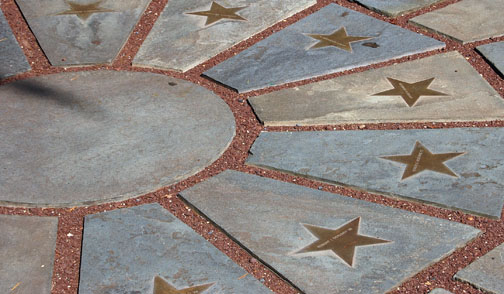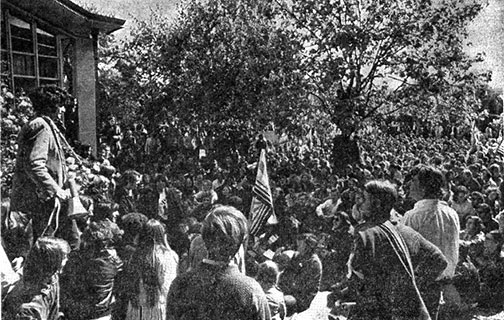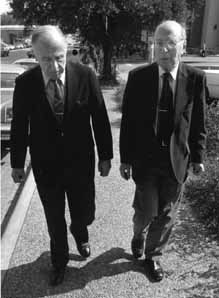“The University will not, as a matter of policy, accept any contracts or grants for the support of classified research.”
— Rules and Procedures of the Professional Researchers and Professional Specialists of Princeton University
Sept. 11 was the first day of classes this fall. But there was still time for the chaplains to gather in Princeton’s September 11 Memorial Garden to offer prayers of all faiths in remembrance of the 13 Princetonians who died that day in 2001. Earlier this year, the Boston Marathon bombs had brought those memories back; the swift pursuit of the perpetrators this time around pointed up many of the infrastructure changes that have advanced the cause of justice and retribution over the last 12 years, from databases to cellphones. We’re certainly safer now.
But the cost, the cost. Money is certainly one thing, but the effects on our culture are potentially more painful. An arm’s-length view recently came from The Economist, which surveyed U.S. misadventures from Guantanamo to Abu Ghraib to Edward Snowden’s NSA secrets and in a cover story described the result as “Liberty’s Lost Decade.” And, in a very uncomfortable echo of the uncomfortable past at Princeton, the discussion has even revived focus on IDA.
If you were hanging around town from the mid-’60s to the mid-’70s and your cognizance extended beyond C floor or the steam tunnels, you knew about IDA. That is to say, you knew as much as anybody, which was vague and alarming all at once. The Institute for Defense Analyses, a name that cheerily told you nothing, popped up on the map, literally, in 1960, when von Neumann Hall was built for its use by the University. Even then, despite a description that amid Cold-War rhetoric sounded benign, the terms “classified and non-classified research,” “[Defense Dept.] Weapons Systems Evaluation Group,” and “communications” gave clues about what was up: Math. Say what? Think of it as a Sputnik-era successor to Bletchley Park of World War II (which had included bright folks like Alan Turing *38) and you’re pretty close; the government needed the most clever numbers people they could get to design its SIGINT (signal intelligence) programs and codes, and the brightest numbers people were in Fine Hall and up the street at the Institute for Advanced Studies. By the early ’60s there were a dozen major universities sponsoring IDA, and its mathematicians (many of them math faculty and scholars on contracts) were absorbed in, uh, stuff (the “non-classified” bits were scarce). By 1968 the classified research was caught up in the anti-Vietnam controversy; the universities all washed their hands of administrative responsibility for the not-for-profit organization (Princeton president Bob Goheen ’40 *48 was on its board until then) amid protests at Columbia and Princeton, but the building and IDA’s lease remained. In 1970, things came to a head: After the invasion of Cambodia, the administration (in the person of Dean of Students Neil Rudenstine ’56) barely avoided physical confrontation between students and local police at IDA, and – incredibly – IDA exercised its lease option for five more years, ostensibly to save $600,000. So its presence next to campus remained a sore point until 1975, when it had to leave von Neumann, but – the convenience being too strategically important – the offices simply moved two miles up the road, into the woods beyond the Princeton Shopping Center, where IDA remains today.
Oddly, I tripped across IDA myself during that torturous five-year phase myself; I just didn’t know it. The IDA presence in Saigon had a different name: NSA, the spooks who were using the algorithms and codes the IDA mathematicians concocted. Those of us in military operations certainly were safer because of them, but they were as mysterious there as IDA was in New Jersey; although I was the intelligence officer (irony alert) for my battalion, I was too junior to have high-enough clearance to see what they were doing, even though they were using my own ♦♦♦♦♦♦♦♦♦. Although it had been around since the 1950s, NSA was essentially unknown to the public (its friends in DARPA were still inventing the Internet, so they didn’t need a website), and they ♦♦♦♦♦♦♦♦♦♦♦ it that way.
Which was still pretty much the case in 1992 and 1993, when Charles Seife ’93 spent his summer internship at NSA. A promising young math student, he was attracted by the sexiness of the algorithms, the brains of the “secret brotherhood of number jocks” at its research operations like IDA, and the assurance that his work would – by force of law – only be directed against foreign enemies of the United States. Now a journalism professor at NYU, he bluntly opines in “An Open Letter to My Former NSA Colleagues” for Slate that the recent revelations of the NSA’s domestic activities subsequent to the Patriot Act have left him “horrified,” and that he can’t imagine that the brilliant mathematicians – including Princeton friends who worked at IDA – who have helped design them aren’t horrified as well. Since the secret (ah, that word again) and generally compliant Foreign Intelligence Surveillance Court (FISA) has accused the NSA of lying even to it, those feelings don’t seem irrational. Let’s just say NSA is a secret no longer, with its domestic activities under severe question; Professor Ed Felten, renowned director of Princeton’s Center for Information Technology Policy, says that regardless of intent, a real adversary to the NSA is necessary in FISA court for viability; Professor Peter Swire ’80 was named Tiger of the Week by PAW’s wise and beneficent editors simply by volunteering to review the situation for the White House.
Princeton has a long history with big-time government secrets. Woodrow Wilson 1879 (how does he repeatedly keep popping up?) signed the 1917 Espionage Act, under which Edward Snowden would be prosecuted for his NSA revelations. The Manhattan Project to design the atomic bomb during World War II involved giants of the Princeton faculty such as Nobel-winner Eugene Wigner, John Archibald Wheeler, Walter Kauzmann, and Henry De Wolf Smyth ’18 (who then became commissioner of the Atomic Energy Commission), and alumni such as Nobelist Richard Feynman *42. Those Princeton scientists were among the most knowledgeable and concerned that Nazi Germany might well create the bomb – controversy remains even today whether, for example, their German counterpart Werner Heisenberg could have easily succeeded, but instead knowingly sabotaged the effort – and so they devoted themselves to the American A-bomb cause. Subsequently, the classified nuclear-fusion efforts related to the hydrogen bomb also led to the consideration of peaceful – and clean – atomic-fusion power and the creation of the Princeton Plasma Physics Lab on the Forrestal Campus, originally under Lyman Spitzer *38 and John Wheeler as “Project Matterhorn.” That work, however, was declassified in 1958 (a fusion reactor can’t explode; if anything goes wrong, it just stops), and remains essentially an open international effort today. Manhattan and Matterhorn, in combination with IDA, led the University by the ’70s to its current policy on managing – not managing, actually – research on classified government projects; there are some codicils, but in essence, the policy appears above: You can work on classified projects (academic freedom and all that), but the University as a sponsoring entity wants no part of it. “We do not allow classified research to happen on campus,” Dean of the Faculty David Dobkin says. “At the same time, we do allow faculty a day a week during term time for outside activities and have no restriction on how this time is used. Indeed, there are some faculty who do consulting of a confidential and/or classified nature in this time. We ask them to tell us how many days they’ve spent doing so and where they’ve done so, but do not ask about the content of the work or their remuneration.”
I assume this has cost Princeton untold millions of dollars over the years. Who knows, it may have made us slightly less safe on Sept. 11, 2001. But the homeland-security phobia since then has often been an ugly thing to watch, and the safety vs. privacy questions involved are as philosophically unsettling in their way as Mutual Assured Destruction (aptly known as MAD) was during the Cold War. These issues are far beyond my pay grade, much as the NSA secrets were in Saigon long ago. But I suspect the University, as a bellwether institution in the ceaseless and unending quest to disseminate human knowledge and enlightenment, does well to stay clear of such quagmires.
What I do know for certain is that it would be comforting to be part of Liberty’s Resurgent Decade sometime.
















No responses yet